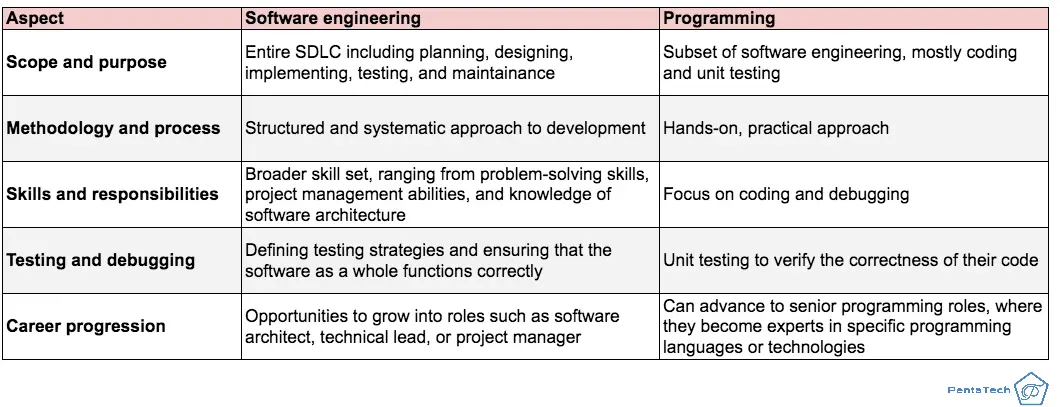In software development, two terms are often used interchangeably “software engineering” and “programming.” While both of these roles involve creating software, they are distinct in terms of their scope, responsibilities, and methodologies. In this blog post, we will delve into the key differences between software engineering and programming, shedding light on the unique aspects of each. Whether you’re an aspiring software engineer or a seasoned programmer, understanding these distinctions is vital for career growth and professional development.
Scope and Purpose
Software engineering encompasses the entire software development life cycle. It involves planning, designing, implementing, testing, and maintaining complex software systems. Software engineers consider the bigger picture, focusing on how a piece of software fits into an organization’s goals and how it can be scaled and maintained over time. They are responsible for building reliable, efficient, and maintainable systems [1].
Programming, on the other hand, is a subset of software engineering. Programmers primarily focus on writing code to implement specific functions or features within a software system. They work with a narrower scope, concentrating on the technical details of making a software component work as intended. Programmers design the individual bricks, meanwhile software engineers design the entire building.
Methodology and Process
Software engineering follows a structured and systematic approach to development. It emphasizes methodologies like Agile, Scrum, or DevOps, which involve rigorous planning, documentation, and collaboration [2]. Software engineers create detailed software specifications, consider various design patterns, and often work with large development teams.
Programming often involves a more hands-on, practical approach. Additionally, programmers typically implement features or fix bugs based on requirements provided by software engineers. While they may follow coding standards and practices, the process can be less formal and more iterative. Programmers work closely with code and may need to adapt quickly to changing requirements.
Skills and Responsibilities
Software engineers need a broader skill set. They must possess strong problem-solving skills, project management abilities, and knowledge of software architecture. They are responsible for making high-level decisions about software design, choosing appropriate technologies, and ensuring the long-term maintainability of the system.
Programmers focus on coding and debugging. Their primary responsibilities include translating software designs into actual code, testing individual components, and fixing issues. While they still need strong problem-solving skills, their work is focused on technical implementation.
Testing and Debugging
Software engineers are responsible for defining testing strategies and ensuring that the software as a whole functions correctly. They oversee various testing phases, including unit, integration, and system testing. Identifying and resolving architectural issues and ensuring the overall system’s reliability is a key aspect of their role.
Programmers conduct unit testing to verify the correctness of their code. They focus on making sure that individual functions or modules work as expected. While they contribute to the overall quality of the software, their primary concern is at the code level.
Career Progression
Software engineers often have a broader career path, with opportunities to grow into roles such as software architect, technical lead, or project manager. Their skills in design and architecture make them valuable in shaping the overall software strategy of an organization.
Programmers can advance to senior programming roles, where they become experts in specific programming languages or technologies. However, their career progression may be more specialized, and they may not be involved in higher-level architectural decisions.
Conclusion

Software engineering and programming are two distinct roles, each with its own set of responsibilities and skills. Software engineering involves a comprehensive approach to software development, focusing on the entire system’s design, scalability, and maintainability. In contrast, programming is a more specific task of writing code to implement features or functions within a software system.
Understanding the differences between these roles is crucial for individuals considering a career in software development. It enables you to choose a path that aligns with your skills and interests. Additionally, organizations benefit from having both software engineers and programmers on their teams, as they complement each other’s expertise and contribute to the successful development of software systems. So, whether you’re on the path to becoming a software engineer or a seasoned programmer, recognizing the distinctions between these roles will guide you in your professional journey and help you make informed career decisions.




